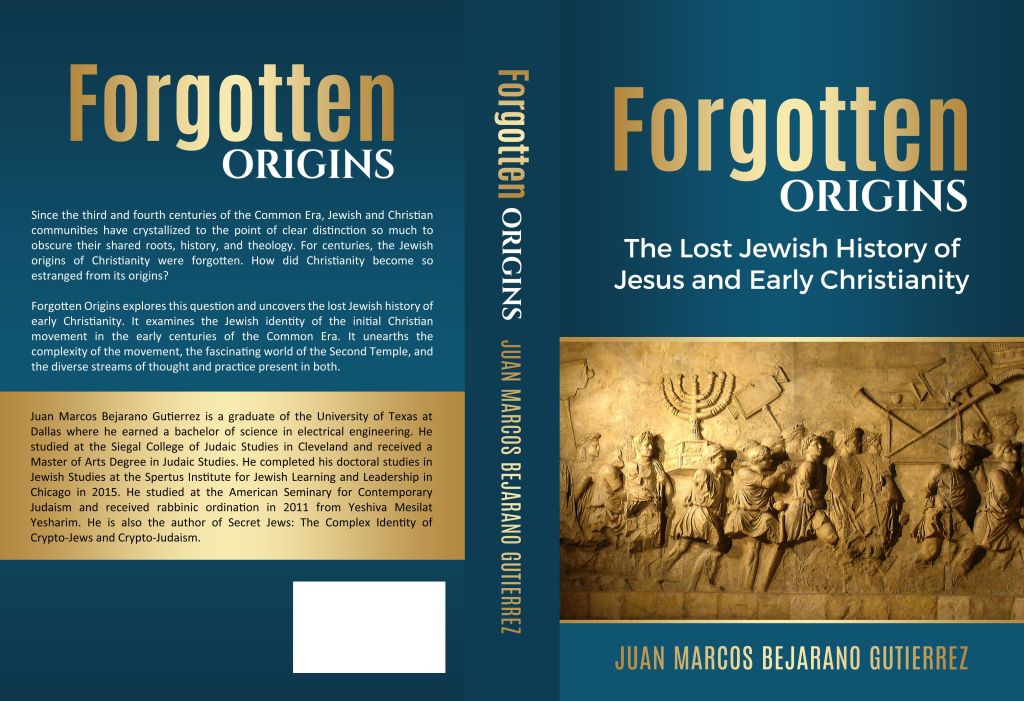Forgotten Origins: The Lost Jewish History of Jesus and Early Christianity. Juan Marcos Bejarano Gutierrez, 2017, Yaron Publishing – TX

I just want to share with you what Juan M. Bejarano Gutierrez says in his Afterword. The writer is Jewish and has a refreshing clear picture of the time of the Apostles roughly between 40-70 AC. He calls this “the lost Jewish history”. This indeed should be called Jewish history and not Christian. After the destruction of the temple and the Bar Kochba revolt, Christianity emerged. And this Jewish history with Jesus at the center was purposefully moved away from history by rabbinical Judaism from that time on. Indeed: lost Jewish history.
Normally the Apostle Paul gets a lot of attention because he is the big shaper of christianity. But this writer’s journey goes with many other figures and historic events based on scriptures; the bible and many extra-biblical sources. And thus he made up a fair Jewish history from early christianity.
If you do justice to history, then unavoidable, one figure emerges quite impressive: Jesus. Especially for a Jew like this writer. The result is a nice Afterword.
In his Afterword he begins to quote Rabbi Nachman of Bratslav, the grandson of Baal Shem Tov who established the Hasidic movement in the 18th century:
“The Mashiach will more than likely be very different than most of us expect. His ideas will even class radically with our own. Ideas about ourselves. About Jewishness. About God.” [1]
Two great challenges happened for the Jews. The delayed manifestation of Jesus’ restoration of Israel and that the number of Jews who believed in Jesus were outnumbered by sufficient numbers of Gentiles who interpreted the message of Jesus independently and even in conflict with Jewish identity. [2]
In the end, as Jacob Neusner asserts the effect is that Judaism and Christianity said different things to different people in different ways.[3]
The writer then says: “But this only partly addresses the issue of the relationship between Jews and Christians. There is something that continues to link Jews and Christians.”[4]
Then the writer mentions the Jewish mystical idea of ‘Tikkun Olam’ according to Lurianic Kabbalah. About the light of God in vessels, which vessels could not contain that light and therefore the light scattered and the vessels shattered. But the light was hidden. The task of humanity is to uncover this light.
He says: “Where the message of Christianity, as related by his followers, and perhaps even in the text themselves fail even to convey at times his message of redemption, we must consider the possibility that his real perspectives were effectively shattered. … Can the message of Jesus have been too powerful to withstand its transmission within earthly vessels?“[5] (Bold mine)
Then the writer ends his book with this sentence: “Perhaps the one thing both Jews and Christians can agree to is the idea that Jesus called Israel to repent. Whether or not Israel is represented by Jews alone or by a composite body of Jews or non-Jews, repentance applies to all. The presence of God among those who call upon the name of the LORD should be something all agree upon.” [6]
[1] Rabbi Nachman’s Wisdom #228. Yehoshua Starret, The Breslov Haggadah (New York: Breslov Research Institute, 1989), 82
[2] Forgotten Origins, 535
[3] Forgotten Origins, 536
[4] Forgotten Origins, 536
[5] Forgotten Origins, 538
[6] Forgotten Origins, 538
Tags: Bejarano Gutierrez, Early Christianity, Forgotten Origins, Jewish history
Leave a comment